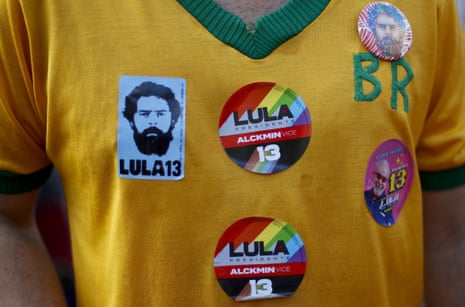Can the Brazil team reunite a divided country – and reclaim the yellow jersey?
he Brazilian national team arrive in Qatar with a well-balanced squad. Football-wise, that is. A solid and experienced defence, a combative as well as creative midfield, and an attack of the highest technical ability made up of players who complement each other well. All this gives the head coach, Tite, a wide range of possibilities of how to set up.
However, a World Cup is not just about the football, as we have seen in Qatar over the past few days. And for Brazil, going in to this tournament, the political situation matters too.
Parallel to the countdown to the World Cup there was the election in which the former president Luiz Inácio Lula da Silva returned to power, beating Jair Bolsonaro. It meant the country took a decisive step towards restoring its young democracy, which had been under threat since the 2016 coup that forced the former president Dilma Rousseff from office and paved the way for the rise of Bolsonaro’s far-right government in 2018.
Four years of erosive leadership, followed by a heavily polarised election, has left Brazilian society deeply divided. To make matters worse, Brazilians have had to watch as the national team’s captain and star player, Neymar, turned his back on the more than 30 million hungry Brazilians and the 120 million who live on the cusp of food insecurity and backed Bolsonaro as part of a supposed fight against a non‑existent communist threat.
Having had such success, the former Santos player with the humble background has clearly lost touch with his roots, as well as the plight and needs of the majority of the population that will cheer for him during the World Cup. It is a sad state of affairs.
Every four years, the presidential elections and the World Cup coincide in Brazil, sending shockwaves across the societal landscape. After Russia 2018, the political hijacking of the historic and highly respected yellow Brazil national team jersey, designed to boost Bolsonaro’s nationalist movement, made millions of Brazilians disown and refuse to wear it, even for a World Cup.
Despite all this there is hope for better days ahead, with many in Brazil supporting the national team and hoping that a successful World Cup can bring the country closer together, kick-starting a sense of reconciliation in a nation with painful, fresh wounds. The process of recovering a Brazilian identity has already started with Lula taking to the international stage during Cop27 in Egypt, showcasing Brazil’s renewed commitment to global diplomacy and environmental leadership. That process will continue on the pitches in Qatar.
GUARDIAN



